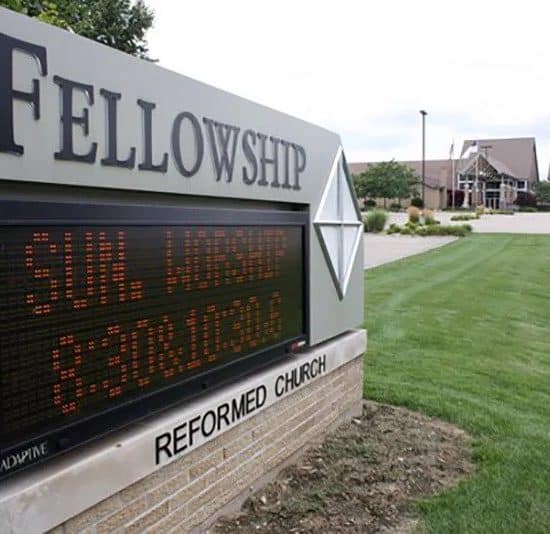Baptists follow the congregational form of church governance — every member who wants can have a say in the way the church and the denomination operate.
But how much access does the average church member have to information about operations of national Baptist bodies and affiliated agencies? That depends on what the member wants to know and often upon whether the institution chooses to release it.

Denominational information may be hard to get.
|
Wade Burleson, senior pastor of Emmanuel Baptist Church in Enid, Okla., believes the Southern Baptist Convention has “lost the principle of transparency.”
An active participant in denominational life, including two terms as president of the Oklahoma Baptist General Convention, he was named a trustee for the SBC International Mission Board in 2005. He came under fire almost from the beginning because he publicly disagreed with board decisions. He did so “because I felt I had an obligation to tell what happened,” he said.
“Jesus said his followers would be known for their love and transparency,” Burleson explained in a recent interview.
Over personnel, “the law is very clear, and I think that personnel issues should be confidential,” he said. “But when it comes to all other information, we should be transparent…. No pastor, board member or Southern Baptist leader has the right to keep information from the people.”
Many agencies apparently do not operate from that perspective. While SBC leaders acknowledge members give money and time voluntarily, that doesn’t mean people in the pew should be entitled to any information they want. The general rule seems to be: It depends upon the question.
But at least a few SBC leaders believe the denomination practices openness for the most part. “I think it is pretty transparent…a lot more than many other denominations,” noted Richard Land, president of the Ethics & Religious Liberty Commission. “The litigious society in which we live makes it difficult.”
IMB spokesperson Wendy Norvelle agreed. “It would be difficult to find any organization as open to its constituents as the agencies of the SBC,” she said. Certain personal details about missionaries, sometimes even the name of the country in which they serve, must be kept confidential.
Often denominational entities want to get word out to church members but feel stymied in the attempt. “The challenge from the convention is that we desperately want to get information to the person in the pew…. We spend lots of time and money (trying to provide convention information) by whatever means,” Baptist General Association of Virginia Assistant Executive Director Glenn Akins said.
But when an individual seeks details, again it depends on the nature of the question.
For example, if Joe or Jane, a member of Regardless-of-the-Size Baptist Church in Anywhere, USA, wants to know how much an agency head earns, Joe and Jane might not be able to find out specifics.
The policy most Southern Baptist-affiliated entities have adopted allows providing the salary range, but not the actual figure. Several agency leaders, including the SBC vice president for convention finance, said they are accountable only to their boards and the Executive Committee for the details.
The SBC includes general budget information for the EC and the agencies in each annual book of reports and posts those reports on its website.
Each entity can decide how much it wants to disclose. The ERLC is willing to answer any questions, Land said, including divulging his salary. However, the agency requires anyone who receives information to sign a nondisclosure agreement.
While some entities may release information, sometimes it’s couched in terms to protect the agency.
Then-Missouri Baptist Convention Executive Director David Clippard terminated several workers under his organization plan in 2002. Official convention minutes listed the individuals as having “resigned.”
Accountability
Some see giving specific information as simply being accountable. Cooperative Baptist Fellowship Heartland (formerly CBF of Missouri) publishes each of its workers’ salary and benefits in the annual budget that it distributes. “We want to make sure the people we relate to and partner with know what we’re doing,” Associate Coordinator Jeff Langford explained.
Many Baptist leaders struggle to find the balance between releasing too much or too little. “There have been colleagues across the states who have wrestled with how much and what kind of information to share, with whom and at what expense,” Akins said.
Churches and groups ask for information for a variety of reasons. Sometimes a church might ask for the names of all deacon chairs or all Sunday school directors in an area. The Virginia convention finds out how the information would be used and determines whether to release the names.
Akins sees agencies as stewards of the information they receive from congregations and individuals. “We always walk a thin line. I’m a steward and how do I protect that information,” he said.
He will give information about specific projects to those directly concerned. “Every donor has a right to know what happened to their gift,” he added.
American Baptist Churches-U.S.A. operates under covenant agreements with autonomous and interdependent partners. Each partner manages its own affairs, including information, and property.
‘Openness’ in secret
Because Baptists rely heavily on volunteer giving and service, often meetings or proceedings are closed, particularly to reporters, to foster expression, Land said. In most SBC agencies, “the media are free to come and are free to cover meetings, but they cannot tell who says what unless they get the person to say the same thing outside of the board meeting,” he explained.
“I do think … that unless you have something like that in place, having the press there does impede or hinder board members from expressing honest opinions.”
When then-SBC President Johnny Hunt authorized creation of the Great Commission Task Force in 2009, he vowed the meetings would be open, Baptist Press reported after Hunt met with editors of the Florida, Georgia, Illinois and Southern Baptists of Texas state papers by conference call that June.
“I would be real open to say that we look forward to every meeting that there will be a state editor there to be able to document the meeting. We have nothing to hide,” Hunt is reported to have said.
However, all meetings were closed, and then all written and audio records were sealed for 15 years to preserve confidentiality when the task force report was released in June 2010.
Albert Mohler, Southern Baptist Theological Seminary president and task force member, claimed open meetings and records would “rob” history and create a “chilling effect” on other committees. Participants would fear recording meetings if people would have immediate access to the records.
A control issue
Despite arguments for confidentiality, Burleson believes the underlying issue, at least for Southern Baptists, is control.
Burleson cited Albert McClellan, former executive director of the SBC Executive Committee, who claimed in 1980 that in 43 years, the Executive Committee had had fewer than six executive sessions. Burleson believes closing meetings is more the norm, rather than the exception, these days.
Every IMB board meeting he attended included a closed-door session, he said. “There were things said and things done” in those sessions that “shouldn’t have been said and done.”
“When you operate in secrecy, it is in the belief that you can control better in secrecy,” Burleson said.
The primary reason he has remained in the Southern Baptist fold and encourages others to do so is because he believes that the atmosphere will change.
“The SBC needs to wake up to the fact that there’s nothing to fear. … Don’t try to control.”
Other church governance models, such as the episcopal form the United Methodists and others follow or the Roman Catholics’ papal form, allow more rigid control. The more hierarchy, the more like the government it becomes, some avenues for decision-making are closed, noted Bill Wilson, president of the Center for Congregational Health.
“I think it does create more feeling that members aren’t being listened to,” he said. “But the bottom line is (to work toward) a culture that says we want to be transparent and open whatever the polity.”

